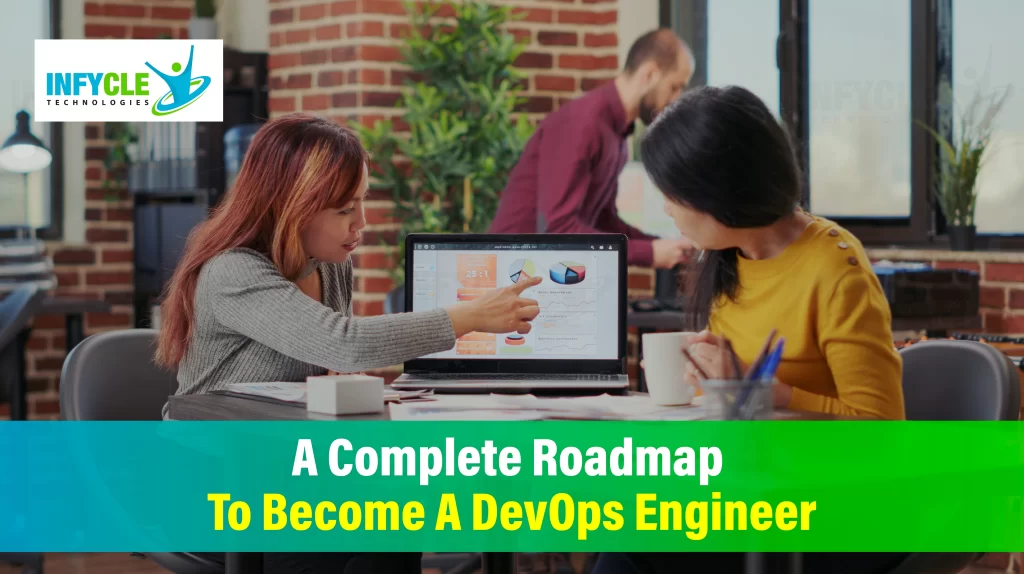A Complete Roadmap To Become A DevOps Engineer
If you’re looking to get into technology or are already in it and looking for new opportunities, you’ve probably heard of Development and Operations (DevOps). DevOps has become one of the most profitable positions in the technology business. The demand for DevOps engineers in India is expected to grow a lot in 2024, with some reports estimating a 25% rise in job openings.
But what is DevOps and how does it vary with other roles?
DevOps is a software engineering methodology that integrates operations (Ops) and development (Dev) to embrace automation and simplify the software development lifecycle. It serves as a link between the operations and development teams.
A software engineer’s primary task is to design and construct software solutions. Still, a DevOps engineer’s responsibility is to optimize the pipeline for developing and deploying software, automating infrastructure provisioning, and improving deployments.
The question is, how do you become a DevOps engineer? How can you master the steps and skills required? This article provides a DevOps roadmap, which shows you the main concepts and steps to becoming a successful DevOps engineer.
What Does It Mean To Be A DevOps Engineer?
A DevOps engineer is a flexible IT specialist with extensive knowledge of both development and operations. They are proficient in system administration, infrastructure management, programming, and the use of DevOps toolchains. These engineers demonstrate excellent interpersonal skills in addition to their technical expertise as they work together across organizational barriers to create a more cohesive workplace.
Their skill set includes a thorough understanding of common system architectures, management, and delivery. They are also knowledgeable about developer tools and procedures, such as using source control, writing unit tests, performing code reviews, and sticking to agile guidelines.
Roles And Responsibilities Of A DevOps Engineer
The following are the key roles and responsibilities of a DevOps Engineer:
- Create and manage CI/CD pipelines to automate deployment and code testing.
- Use tools like Terraform and Ansible to automate the setup, configuration, and scalability of your infrastructure.
- Put monitoring and logging systems in place to maximise performance and respond quickly to problems.
- Work together with the operations, QA, and development teams to optimize processes.
- Use Docker and Kubernetes to deploy and administer containerized applications.
- Oversee cloud environments for scalable infrastructure (AWS, Azure, Google Cloud).
- Use best practices and vulnerability assessments to ensure security and compliance.
- To keep system configurations consistent, use configuration management technologies such as Chef or Puppet.
- Automate monotonous processes to increase development lifecycle productivity and efficiency.
- Investigate and fix problems in development and production settings.
- Constantly improve system performance by resolving bottlenecks as necessary.
- To avoid data loss, put disaster recovery and data backup procedures into practice.
- To share knowledge among the team, document procedures, setups, and best practices.
- Encourage a culture of cooperation, ongoing education, and development in DevOps.
The Skills Needed To Work As A DevOps Engineer
To become a proficient DevOps Engineer, here are the essential skills you’ll need:
- Linux Fundamentals: Since the majority of DevOps tools operate on Linux-based platforms, Linux proficiency is essential.
- Coding and Scripting: To automate processes, one must be proficient in scripting languages such as Python, Ruby, or Bash.
- Pipelines for CI/CD: Being familiar with tools such as Jenkins, GitLab, or CircleCI, as well as the methods of Continuous Integration and Continuous Deployment (CI/CD).
- Configuration Management: Be familiar with infrastructure management platforms such as Ansible, Chef, or Puppet.
- Containerization: Knowledge of Kubernetes and Docker for orchestration and administration of containers.
- Cloud Platforms: Expertise in cloud services such as Google Cloud, AWS, and Azure.
- Logging and Monitoring: Proficiency with logging technologies such as ELK Stack as well as monitoring tools like Prometheus and Nagios.
- Understanding the fundamentals of networking, such as DNS, TCP/IP, and VPN, is important.
- Knowledge of Infrastructure as Code (IaC) tools for cloud infrastructure provisioning and management, such as Terraform or CloudFormation.
- Collaboration and Communication: To handle complicated projects and operate well in cross-functional teams, one needs strong communication skills.
Explore our blog to learn about “What Qualifications Do I Need To Work In AWS?” to launch a successful career in AWS!
So, how do you acquire these vital skill sets? In what order do you learn these skills?
The following section provides a comprehensive DevOps roadmap describing how to acquire such skills and become a DevOps engineer.
How To Become A DevOps Engineer
To automate and optimize processes across the software development phases, a DevOps engineer must become proficient in a combination of development and operations skills. This is a detailed guide on how to begin your career in DevOps:
1. Learn the Fundamentals of DevOps
Learn the basics of DevOps, which integrates IT operations (Ops) with software development (Dev) to produce dependable updates, short development cycles, and enhance deployment frequency. Develop a solid understanding of DevOps fundamentals, including automation, collaboration, monitoring, continuous integration, and continuous delivery (CI/CD).
2. Boost Your Programming Foundation
A strong grasp of programming languages is necessary. Since coding languages like Python, Bash, or Ruby are frequently used in automation, start with them. It’s also essential to understand version control, particularly Git, general programming concepts, and how to operate code repositories on sites like GitHub or GitLab.
3. Develop your command-line and Linux skills
It is essential to have a strong understanding of Linux and its command-line interface (CLI) in DevOps settings. Learn how to use package managers, control permissions, and browse the file system. Additionally, comprehend the fundamentals of networking, as these are crucial when handling cloud infrastructure and services.
4. Gain Practical Knowledge with CI/CD Tools
The core of DevOps is Continuous Integration and Continuous Deployment, or CI/CD. Learn how to use well-known CI/CD systems that manage code testing and deployment, such as Jenkins, GitLab CI, Travis CI, or CircleCI. Gaining an understanding of CI/CD pipelines will accelerate the production cycle and enhance teamwork.
5. Master Infrastructure as Code (IaC)
With IaC, teams can increase up or down without human involvement by managing infrastructure with code. Infrastructure that is scalable and repeatable requires the use of tools like Terraform, Ansible, and CloudFormation. Practice using these tools for establishing cloud resources and gain hands-on expertise in developing IaC templates.
6. Get to know Configuration Management
Ansible, Chef, and Puppet are examples of configuration management systems that assist you in automating infrastructure installation and maintenance. Gaining knowledge of these technologies can help you manage setups, distribute software, and guarantee uniformity across environments. To develop a solid basis in infrastructure configuration management, become familiar with these technologies.
7. Explore Cloud Computing Platforms
A key component of recent DevOps procedures is cloud computing. Learn how to use at least one of the main cloud platforms, including Microsoft Azure, Google Cloud Platform (GCP), or Amazon Web Services (AWS). Discover how to set up and maintain databases, storage, network connectivity, and instances. You can become an AWS Certified DevOps Engineer by obtaining a cloud certification through AWS DevOps training in Chennai, which can help advance your career.
8. Gain Knowledge Of Orchestration and Containerization
Containerization is a popular technology for packaging applications and their dependencies, while orchestration tools manage containers across multiple environments. Learn Docker for containerization, and Kubernetes for orchestration. Kubernetes, in particular, is an industry-standard tool for managing containerized applications.
9. Develop Your Logging And Monitoring Skills
To find and fix problems before they have an impact on end users, monitoring and logging are crucial. Learn how to use Prometheus, Grafana, Splunk, and the ELK Stack (Elasticsearch, Logstash, Kibana) to track apps, examine performance, and solve problems instantly.
10. Continue To learn And Work For Continuous Growth
Since the DevOps environment is always changing, a dedication to lifelong learning is crucial. Follow DevOps blogs, go to webinars, and enrol in the best software training institute in Chennai for online courses to stay current on emerging tools, technologies, and standard procedures. Acquiring practical experience via projects, internships, or open-source contributions will additionally help in the efficient implementation of your knowledge.
Who Can Become A DevOps Engineer?
Anyone with the appropriate set of skills can work as a DevOps engineer. Transitioning into a DevOps engineer position is generally simpler if you are a Backend Engineer, Infrastructure Engineer, or Systems Engineer. If you want to work as a DevOps engineer, it is recommended to acquire the necessary knowledge and skills. After that, you can apply for internships and entry-level DevOps engineer jobs. You can search for DevOps engineer positions on distant job boards or at local companies.
Your present skill set and real-world experience will determine how long it takes you to move into a DevOps career. To start your DevOps career off right, you must stick to the above-planned learning roadmap.
Conclusion
Although it’s a challenging job, becoming a DevOps engineer is a satisfying and fulfilling one. Follow the DevOps roadmap to gain the essential skills and knowledge for success in this position.
Keep in mind that this roadmap serves as a starting point for your learning process rather than a final or comprehensive guide. As new DevOps methods and technologies continue to emerge, you should always be learning new things and keeping up to date.





